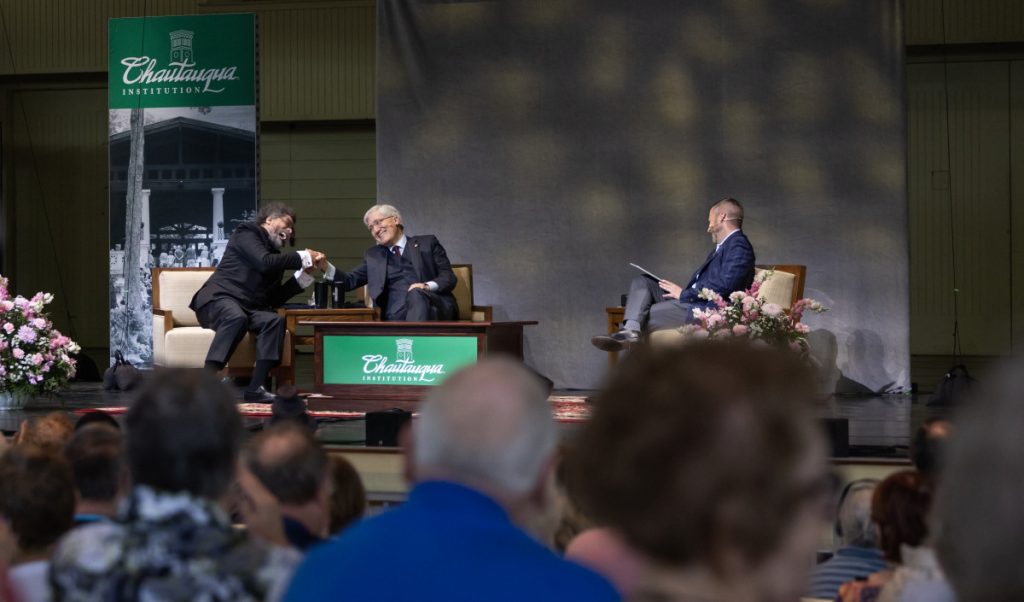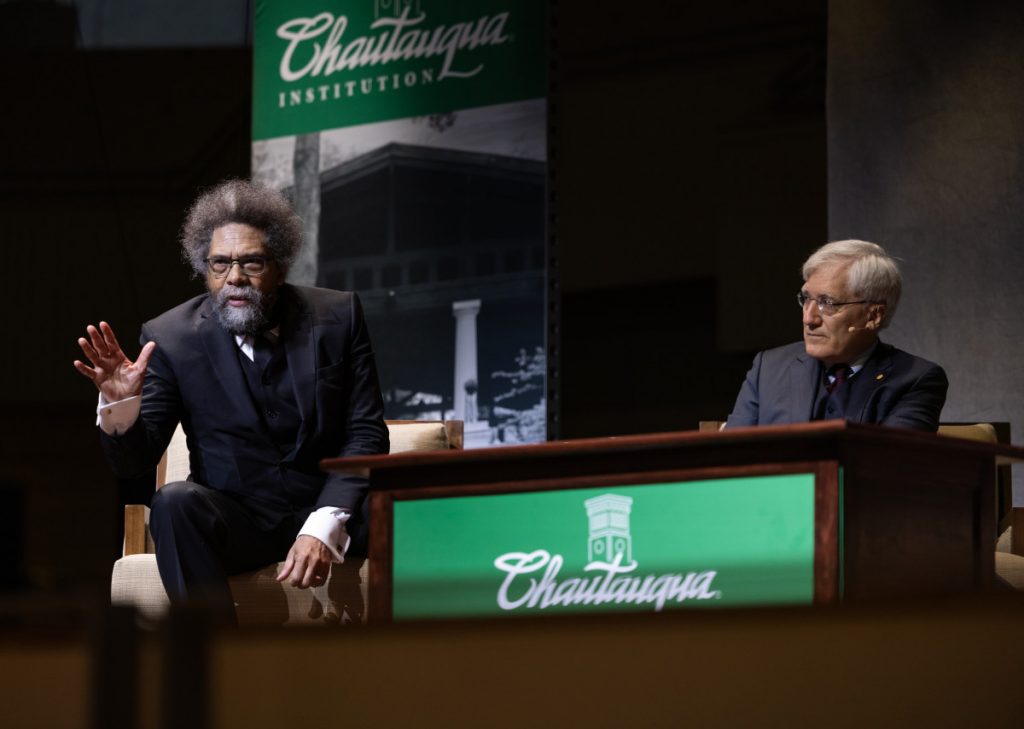
Alton Northup
Staff writer
The friendship between Robert P. George and Cornel West began early in their tenure at Princeton University, where George noticed West was asking all the right questions.
George, a conservative, noted the progressive West’s questions did not always arrive at the right answers, yet were “questions of meaning and value.” The two discussed how these questions sustain their friendship despite their political divide with Chautauqua Institution President Michael E. Hill at 10:45 a.m. on Monday in the Amphitheater for the season’s first morning lecture and the first lecture of the Chautauqua Lecture Series Week One theme, “On Friendship.”
The pair’s origin can be traced back to a campus magazine at Princeton that asked professors to interview a colleague of their choice. To George’s surprise, West — now the Dietrich Bonhoeffer Chair at Union Theological Seminary and a recently declared third-party candidate for president of the United States — chose him for what should have been a two-hour interview.
“This was not an interview,” said George, Princeton University’s McCormick Professor of Jurisprudence and director of the James Madison Program. “This was a rocking and rolling discussion and debate on all the issues we’ve been talking about for years.”
There was no pulling the two from their conversation and, as the tape ran out, George said they realized they should get to know each other better. So, they planned for lunch and days later agreed to teach a freshman seminar together.
“From the moment we started teaching together in the classroom, what some people call the chemistry – but that’s just too weak a word – the magic was there,” George said.
The two continued teaching together until West moved to Harvard University, deciding then to take their conversations on the road and share with audiences what George called one of the greatest joys of his life – not just his friendship, but his admiration for West’s ability to teach by example. A part of what he teaches is acceptance of all, simply because of their humanity.
“We are brothers in the deepest sense. It goes so far beyond political agreement,” West said. “I love him when he’s wrong; I love him when he’s right. I try to correct him; he tries to correct me. We revel in each other’s humanity even though we’re both cracked vessels.”
West said their friendship should not make them an odd couple; he reflected on a time when siblinghood in professionalism was the norm. Now, he said, that piece is missing – substituted instead with conformity, arrogance and condescension toward outsiders.
“What we have here is not because we’re so special. … (If) you don’t agree with members of your family politically, you still love them, you still connect with their humanity,” he said. “We’ve become so polarized it’s hard to be able to make that connection.”
The two bridge this gap through their shared love of the truth. This does not mean they always arrive at the same conclusion – disagreements are frequent – but they are not opposed to changing their opinions.
“The danger, and I think what has caused so much harm in our society, is people fall so deeply in love with their opinions. They become so identity-forming for people,” George said. “They wrap their emotions so tightly around their opinions that they love the opinions more than truth.”
Creating space for your opinions to be challenged, George said, is the only hope for knowing if you are wrong. He shared a lesson the two learned from Plato: The person who causes you to rethink is not your enemy, but your friend.

“We’re all fallible,” George said. “We know we can be wrong even about the deep, important questions.”
It is through the proper currency of intellectual discourse – reason, evidence and arguments – that one can understand strongly held opinions. Those who circumvent this transaction, George argued, do not act in good faith. But those who do, should not be ignored.
Apprehension toward these transactions, West argued, comes from a lack of trust. Trust, he said, allows people to be vulnerable enough to disagree.
“We’re losing that, and no democracy can survive without it,” he said.
The two are often asked how someone can be both open-minded and a person of conviction. George’s answer is found in the liturgy of Yom Kippur, where congregants atone for sins that include stealing, cheating, lying and being zealots for bad causes.
“You don’t lie by mistake,” he said. “You can say something that’s not true by mistake, but if you believe it’s true, that’s not a lie.”
Simple as it may be, George compares the act of challenging one’s opinions to giving a cashier short change. If it was not done in bad faith, you correct it without issue; it should be the same with the opinions.
George said it is the total conviction to one’s opinions that leads to dogmatists, ideologues and demagogues.
On the topic of ideology, George was hesitant to endorse West’s candidacy for president but eager to endorse his integrity, his honesty, his compassion, his love of people, and his selflessness. West was equally hesitant to talk about his candidacy but wants to ensure his values are at the forefront of it.
“I am tied to a cause and a calling,” he said. “And that’s what brings Brother Robert and I together. You see, truth-seeking and justice-seeking is a calling.”
The presidency, he said, is secondary. It is just a vehicle for him to carry out his calling. And the calling he charges Chautauquans with is one of courage.
“Courage is the enabling virtue of all the other virtues. Courage is by example, with the body; you’ve got to put your body in it,” he said. “We in the Black tradition call that being a funk master because a funk master gets beyond the deodorized language and sanitized and sterilized discourse. In the funk is the freedom, and the love, and the pain, and the hurt, and the smile through tears. See, that’s what courage is and the only way you get it is to do something beyond language.”
It was through courage and examination of the self that their friendship began so many decades ago, and George encouraged Chautauquans to make friends with someone who they have serious disagreements with, too.
“Knowing is an activity,” he said. “There’s something noble and ennobling about truth seeking.”




